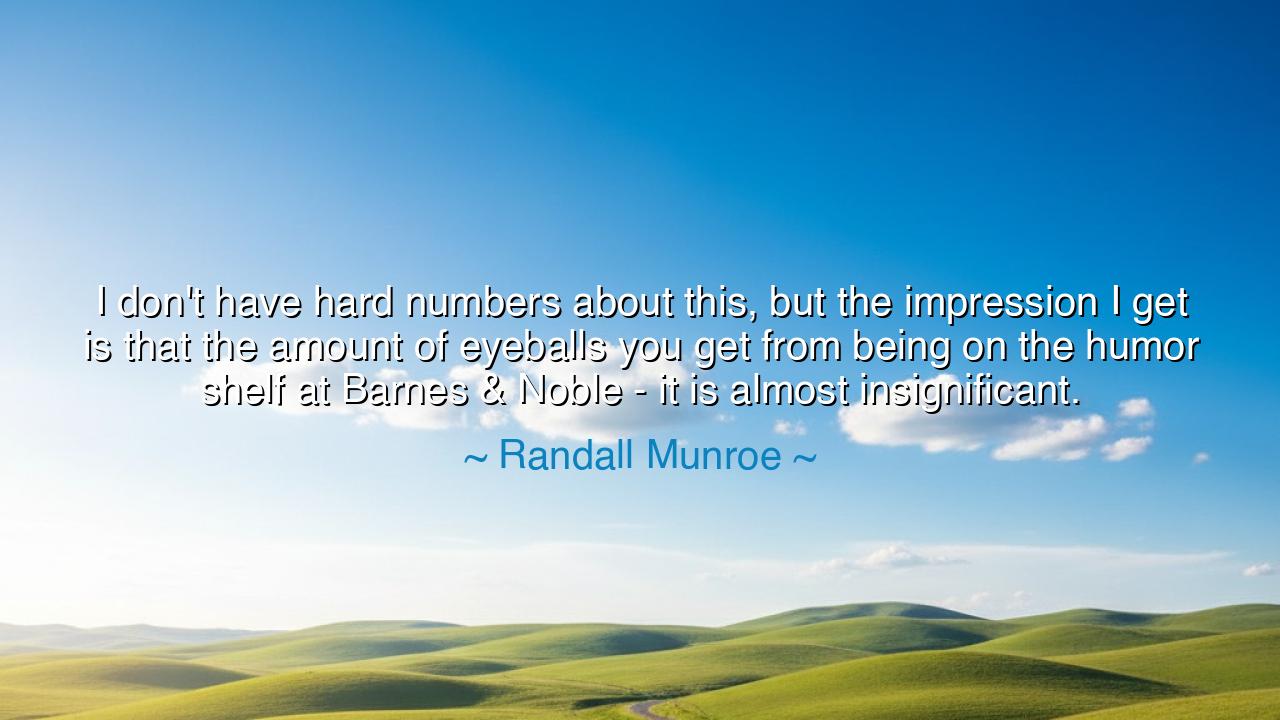
I don't have hard numbers about this, but the impression I get is
I don't have hard numbers about this, but the impression I get is that the amount of eyeballs you get from being on the humor shelf at Barnes & Noble - it is almost insignificant.






In the words of Randall Munroe, the creator of xkcd, whose wit bridges the worlds of science and satire, we find a reflection both humble and profound: “I don’t have hard numbers about this, but the impression I get is that the amount of eyeballs you get from being on the humor shelf at Barnes & Noble — it is almost insignificant.” Though he speaks of bookstores and readers, his words are not merely about sales or shelves, but about the nature of recognition itself — how fleeting, how hollow, and how often misplaced it can be. Beneath the humor lies the truth of our age: that the pursuit of genuine connection matters far more than the pursuit of visibility.
In the ancient world, the poets and philosophers did not measure their worth by the crowds that heard them, but by the clarity of their message. Socrates spoke not to a multitude, but to a handful who sought truth — yet his words still echo across millennia. The sages of old wrote not for shelves, but for souls. They knew that true impact is not found in numbers, but in depth — the depth of understanding, the depth of honesty, the depth of heart. Munroe’s words remind us of this same eternal truth: that fame, especially when defined by where one’s work is placed or how it is categorized, is but a flicker of light against the vast horizon of meaning.
The humor shelf at Barnes & Noble stands as a symbol of all the places the world tries to put us — neat little boxes of expectation, categories that simplify but never truly define. Yet the spirit of creation resists such confinement. For Munroe, whose humor is woven with intellect, curiosity, and wonder, to be labeled merely as “humor” is to miss the essence of his art — a bridge between laughter and enlightenment. And so, his observation becomes a quiet rebellion: a reminder that worth is not measured by the shelf, but by the spark a work ignites in those who find it.
Consider the tale of Nikolai Gogol, the Russian writer whose works — dark, strange, and filled with biting humor — were often misunderstood in his time. He was placed among jesters, though his stories cut deeper than comedy. Yet through ridicule and neglect, Gogol endured, his laughter carrying the pain of truth. Only generations later did the world see the wisdom hidden behind his irony. So too, Munroe’s words warn us: the world may not see your worth immediately, nor honor it in the right places. But the value of creation lies not in the applause of strangers, but in the quiet recognition of those who understand.
In truth, the “eyeballs” — the passing attention of the crowd — are the most fragile of currencies. They gather like waves and vanish just as swiftly. But the true artist, thinker, or dreamer does not seek the gaze of many; they seek the awakening of one — the moment when one mind, one heart, one spirit is stirred. The ancients called this anamnesis — the remembering of truth. And it is through such remembrance that the creator fulfills their purpose, not through the counting of eyes, but through the touching of souls.
From this, we may draw a timeless lesson: do not measure the worth of your work by where it stands, or how many see it, but by what it stands for. The stone that lies unseen beneath the earth may hold more strength than the pillar in the sun. True influence grows in silence, not spectacle. The brightest wisdom often hides in humble corners, waiting for those who are ready to seek it. So, create not for the shelf, but for eternity. Speak not for applause, but for truth.
And so, let us live by this teaching: strive to build works of substance, not of popularity. Let our creations — whether words, deeds, or dreams — be rooted in authenticity, not vanity. For the shelves of the world are crowded and fleeting, but the human spirit is vast and enduring. When we create for meaning, not for recognition, we join the company of the wise — those whose voices, though once unheard, still echo through time, whispering to all who dare to listen.






AAdministratorAdministrator
Welcome, honored guests. Please leave a comment, we will respond soon